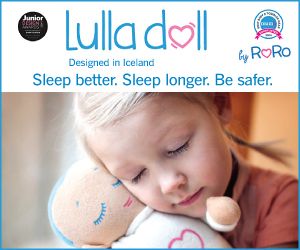Talking About Teething

We recently sat down with Dr. Kenneth Montague of Kenneth Montague and Associates in Toronto and asked him some of the most commonly asked teething-related questions.
At what age will my baby have all her teeth?
The age when a baby gets her teeth in is really all over the place.
Baby teeth start developing during the first three months of pregnancy. The growing of the teeth into the mouth is called ‘eruption’. Different teeth develop and erupt at different ages, but typically teeth start to come in at about six months of age. By 12 months your baby can have eight to 12 teeth including some back teeth, between the ages of two and three your child should have a complete set of teeth – a total of 20 baby teeth. If you are at all concerned, you should check with your dentist, usually it’s no reason to panic, but the dentist may want to take an x-ray and say “Oh they are all there, they just haven’t come in yet”. Each baby develops at a different rate, so don’t panic if your baby’s teeth are coming in faster or slower than other babies.
Is it possible for my baby to be teething at three months?
You typically do not see any teeth before six months, but some babies may have them a few months earlier or later. Crazily enough, all the Montague children were born with one tooth. A significant amount of kids are actually born with one tooth and that’s always a frightening thing for parents.
Do molars hurt more than incisors when they come in?
Molars typically do hurt more simply because they are bigger teeth than the ones at the front. The surface area is greater so the amount of inflammation is greater. With front teeth your baby can get more relief by biting on things, but for the molars it is harder to get to that back tooth – it’s like that itch you can’t scratch. It’s not because molars have more nerve endings, it’s simply because they can’t be employed in the same way front teeth can through biting.
The most common and number one symptom would be drooling. Drool rash is also a common symptom. This is when babies, depending on their skin sensitivity, get a red, raised, irritating rash around the lips and chin. Babies can also develop drool diarrhea. Because the baby is drooling so much and ingesting so much of that saliva, it can cause their stool to loosen. They may also get a diaper rash during the peak teething time because of this. Fever and irritability are also symptoms. The important thing to remember with teething fever is that it is a low-grade fever (about 38.3 degrees) and is a side effect of the inflammation. Biting can also be a symptom. Many babies will bite or gnaw on things like your knuckles, arms or on the breast to help with the discomfort. Also, sometimes the distraction of the pain can cause children to stutter. They can begin to say something then stop because their attention goes to the pain. They may also refuse to feed. The good thing for parents to remember is that all these things are temporary/
The main difference between a cold and teething is that teething mucus is clear saliva and generally doesn’t run out the nose, whereas mucus from a cold is a thick and yellow nasal discharge. Also, teething rarely causes a fever higher than 38.3 degrees. An ear infection however, is usually accompanied by a higher fever. The main thing to know is that babies don’t usually get progressively sicker with teething as they would with an ear infection or a cold. Also, with ear infections babies’ ears usually ache more lying down so babies tend to cry when they lie down.
You shouldn’t always contribute a baby’s irritability to teething. A general rule is to always have a doctor check it out and never ignore a fever.
Why does my baby tug at his ears?
Babies may tug at their ears because the pain is radiating from the teeth to the ears. Tugging at the ears is not a reliable sign because some babies just like playing with their ears.
How do I help my baby through the pain caused by teething?
There are several things you can do to help ease your baby’s pain. You can rub their gums using a clean finger or with the back of a small, cool spoon or teething ring. You can also check with your dentist, doctor or pharmacist to prescribe an over-the-counter medicine that can ease the pain, such as infant Tylenol or any other acetaminophen.
I don’t recommend using an analgesic or pain killer that can be rubbed on the gums, but if you do decide to use one, only use a little bit. If you use it too often or too much of it your baby can swallow it and may actually overdose and get a little “spaced out”. There are a lot of products that can be used to soothe pain in the mouth without having to resort to a pain killer and they are usually herbal. Check your local health food store or visit with a Naturopathic doctor for some alternative suggestions for pain relief.
Some people may get carried away with giving their baby too many teething biscuits. This isn’t really the best idea because most have sugar added or contain hidden sugar. A good idea is to make your own sugar-free teething biscuits instead. Make sure that they have something to rub on their gums. A teething ring, a cool spoon, or a hard rubber toy are all good options.
When should my baby start to brush his teeth?
Do we use toothpaste?
From birth you can start getting your baby used to the idea of brushing their teeth by rubbing a soft washcloth dampened with warm water along their upper and lower gums for five to ten seconds when they wake up. As soon as the first teeth start coming in, you can introduce the smallest sized toothbrush, which you can get from your dentist.
Toothpaste is like a detergent for the teeth. While it is not harmful, you will only want to use a tiny pea-sized amount for your child. It is important that you use toothpaste made for kids. Regular adult toothpaste contains more fluoride than they need and they usually get enough from water – depending on where you live. Too much fluoride can also lead to a condition called fluorosis, which causes their teeth and bones to get brownish. As a general rule, you don’t want to introduce an adult toothpaste until you know your child will not swallow it, usually around five or six years of age.
 Dr. Kenneth Montague graduated from University of Toronto’s Faculty of Dentistry in 1987. Since opening his group practice in 1992, Dr. Montague has twice been voted “Best Dentist” in NOW Magazine’s reader’s poll.
Dr. Kenneth Montague graduated from University of Toronto’s Faculty of Dentistry in 1987. Since opening his group practice in 1992, Dr. Montague has twice been voted “Best Dentist” in NOW Magazine’s reader’s poll.
Dr. Montague and Associates 800 Bathurst Street, Suite 503Toronto, ON M5R 3M8 416.533.371 Visit their website at www.wordofmouthdentistry.ca



